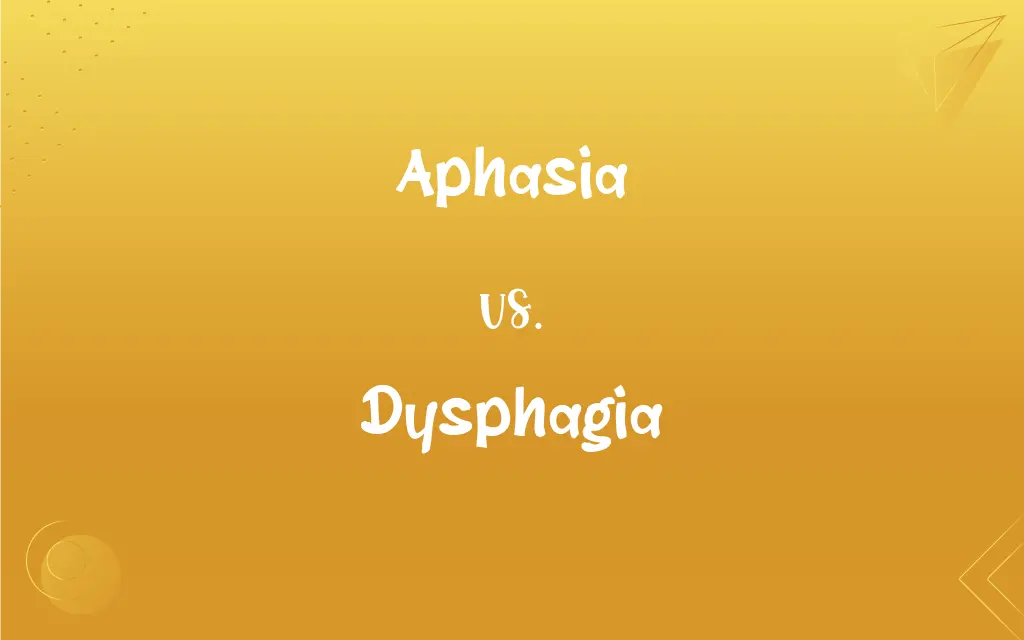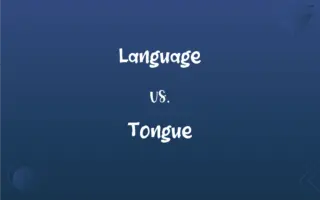Aphasia vs. Dysphagia: What's the Difference?
Edited by Aimie Carlson || By Janet White || Updated on November 13, 2023
Aphasia is a condition affecting speech and language skills, often due to brain damage. Dysphagia refers to difficulty in swallowing.

Key Differences
Aphasia is a neurological disorder affecting communication abilities, often due to brain injury. While, dysphagia involves difficulty or discomfort in swallowing, possibly due to muscular or nerve problems.
Individuals with aphasia may struggle with speaking, understanding speech, reading, or writing. Whereas, dysphagia sufferers may experience pain, coughing, or choking when swallowing.
Aphasia does not affect intelligence, but it impairs the ability to communicate effectively. Dysphagia can lead to nutritional problems, as eating becomes challenging.
Causes of aphasia often include stroke or head injury, affecting language centers in the brain. Dysphagia can result from conditions like stroke, cancer, or neurological disorders affecting the throat muscles.
Treatment for aphasia typically involves speech and language therapy. Dysphagia management may include dietary changes, swallowing therapy, or medical intervention.
ADVERTISEMENT
Comparison Chart
Definition
A communication disorder affecting language skills
A swallowing disorder causing difficulty in swallowing
Symptoms
Impaired speaking, understanding, reading, or writing
Pain, coughing, or choking while swallowing
Caused By
Brain injury (like stroke) affecting language centers
Various, including muscular or neurological disorders
Effect on Daily Life
Communication difficulties, social interaction challenges
Eating difficulties, potential nutritional issues
Treatment
Speech and language therapy
Dietary modifications, swallowing therapy, medical treatments
ADVERTISEMENT
Aphasia and Dysphagia Definitions
Aphasia
Loss of ability to understand or express speech.
After the stroke, he was diagnosed with aphasia.
Dysphagia
Swallowing disorder that can cause coughing or choking.
Dysphagia makes it risky for him to drink liquids quickly.
Aphasia
Impairment in language due to brain damage.
Aphasia can result from a traumatic brain injury.
Dysphagia
Difficulty or discomfort in swallowing.
He experiences dysphagia when eating solid foods.
Aphasia
Difficulty with speech and language comprehension.
Aphasia has affected his ability to participate in conversations.
Dysphagia
A symptom of various medical conditions affecting swallowing.
Dysphagia is common in patients with advanced Parkinson's disease.
Aphasia
A neurological condition affecting language processing.
Her aphasia made reading and writing difficult.
Dysphagia
Challenges in swallowing leading to nutritional concerns.
Due to her dysphagia, she follows a special diet to ensure proper nutrition.
Aphasia
A disorder affecting word finding and language use.
She uses alternative communication methods to cope with her aphasia.
Dysphagia
A condition often associated with throat muscle problems.
Her dysphagia was a result of weakened throat muscles.
Aphasia
Partial or total loss of the ability to articulate ideas or comprehend spoken or written language, resulting from damage to the brain from injury or disease.
Dysphagia
Difficulty in swallowing.
Aphasia
(pathology) A partial or total loss of language skills due to brain damage. Usually, damage to the left perisylvian region, including Broca's area and Wernicke's area, causes aphasia.
Dysphagia
(pathology) Difficulty in swallowing.
Aphasia
Loss of the power of speech, or of the appropriate use of words, the vocal organs remaining intact, and the intelligence being preserved. It is dependent on injury or disease of the brain.
Dysphagia
Difficulty in swallowing.
Aphasia
Inability to use or understand language (spoken or written) because of a brain lesion
Dysphagia
Condition in which swallowing is difficult or painful
FAQs
Does aphasia affect a person's intelligence?
No, aphasia affects communication abilities, not intelligence.
What causes aphasia?
Aphasia is typically caused by brain damage, often from a stroke or head injury.
Is dysphagia related to throat pain?
Dysphagia can involve throat pain, but its primary symptom is difficulty swallowing.
Can children have dysphagia?
Yes, children can experience dysphagia due to various conditions.
Can aphasia be cured?
While some forms of aphasia can improve, it often requires long-term therapy and may not be fully curable.
Are there different types of dysphagia?
Yes, dysphagia can be classified based on where the swallowing difficulty occurs.
Can dysphagia lead to other health problems?
Yes, it can lead to nutritional deficiencies and aspiration pneumonia.
What are the treatment options for dysphagia?
Treatments include dietary modifications, swallowing therapy, and sometimes medical or surgical interventions.
Can medication help with dysphagia?
Medication can help in some cases, particularly if dysphagia is related to an underlying condition.
Is aphasia always severe?
The severity of aphasia can vary widely from mild to severe.
How is aphasia diagnosed?
Aphasia is diagnosed through language assessments by healthcare professionals.
How does aphasia impact social interactions?
Aphasia can make social interactions challenging due to communication barriers.
Are there support groups for aphasia?
Yes, there are various support groups and resources available for individuals with aphasia.
Is technology used in aphasia treatment?
Yes, various technological aids can assist in communication for those with aphasia.
Are there exercises to improve dysphagia?
Yes, specific swallowing exercises can be prescribed to strengthen the muscles involved in swallowing.
Can lifestyle changes improve dysphagia?
In some cases, lifestyle changes like altered eating habits can help manage dysphagia.
Can dehydration occur with dysphagia?
Yes, difficulty in swallowing liquids can lead to dehydration.
Can aphasia affect reading and writing?
Yes, aphasia can impact the ability to read and write.
Is dysphagia always a permanent condition?
Not always; it can be temporary, depending on its cause.
Does age affect the risk of aphasia?
The risk of conditions that cause aphasia, like stroke, increases with age.
About Author
Written by
Janet WhiteJanet White has been an esteemed writer and blogger for Difference Wiki. Holding a Master's degree in Science and Medical Journalism from the prestigious Boston University, she has consistently demonstrated her expertise and passion for her field. When she's not immersed in her work, Janet relishes her time exercising, delving into a good book, and cherishing moments with friends and family.
Edited by
Aimie CarlsonAimie Carlson, holding a master's degree in English literature, is a fervent English language enthusiast. She lends her writing talents to Difference Wiki, a prominent website that specializes in comparisons, offering readers insightful analyses that both captivate and inform.































































